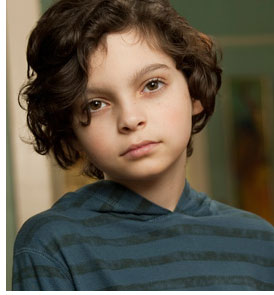TV’s “Parenthood” … have you tuned in?
by Kristen
 Read Kristen Barnfield’s biography.
Read Kristen Barnfield’s biography.
My favorite show on TV right now is NBC’s Parenthood. I can’t get enough of the trials and tribulations of the “very large, very colorful and imperfect Braverman family.” I’m especially hooked when it comes to any plotline involving Max, a bug-loving, roller-coaster-riding, pesky little brother.
In the last episode I saw, Qualities and Difficulties, Max learns (in not the best way) that he has Asperger’s Syndrome. Now that the cat’s out of the bag, Max wants to know about autism — what is it? His parents sit down with Max, and their explanation isn’t anything Max can really understand. His lack of response triggers his parents’ emotions. When Max’s mom starts crying, Max asks to go to his room and runs off. Max’s dad tries to give his wife some support, but she tells him to stop and dissolves in a puddle of sobs.
These scenes were so striking. I felt so strongly for Max and his parents that I found myself tearing up as they struggled to find words. What went through Max’s head in that moment? His parents’? Why did Max’s parents choose to hide his autism diagnosis from him anyway? What’s that moment of realization like for people living with autism? How do kids feel when they learn they have autism? And as a parent, how do you explain to your child that he or she has autism — and what it means?
I turned to Parenthood’s Ask the Experts blog for a little more insight. Their expert, Roy Q. Sanders, M.D., says most children with moderate or high-functioning autism/Asperger’s come to a developmental point when they realize there are things “different” about their lives. They may not be able to understand what exactly is different, but they can recognize that they have therapies or appointments that other children do not. Or they may notice that they don’t like the same things that other children enjoy. Or they may wonder what their parents are talking about with the doctors and therapists they bring them to visit.
Often they might feel that having to do all these extra things, or other people not liking what they like, or not following their perception of the rules, is “unfair” and a clear violation of their rights. Often, when told for the first time that they have been given a diagnosis with the label autism, they protest and honestly ask “Why? There’s nothing wrong with me.” I especially liked Sanders’ closing thoughts:
For children with autism, developing a realistic sense of their autism diagnosis to the best of their understanding is empowering for them and for the people in their lives who strive to guide them and love them. Having a name for something is a powerful tool for navigating the world — a world that for someone with autism is often a confusing place where you can use all the power you can get.
Reading all this got me thinking about our Easter Seals and autism blog, what would our readers think? How did they react to this episode? What tools have you found to help navigate conversations about autism with your loved ones? If you watch parenthood, I’d love to hear from you.
Haven’t seen the show yet? Tune in! I’m certain you’ll fall in love with the Braverman’s just like I have. The next new episode airs Tuesday, March 29 on NBC. Trust me, you won’t be disappointed!







March 21st, 2011 at 9:07 pm
Haven’t seen this show yet but now, thanks to your post, I’ll give it a look.
March 21st, 2011 at 6:58 pm
Great post, Kristen! And, I love this show, too!